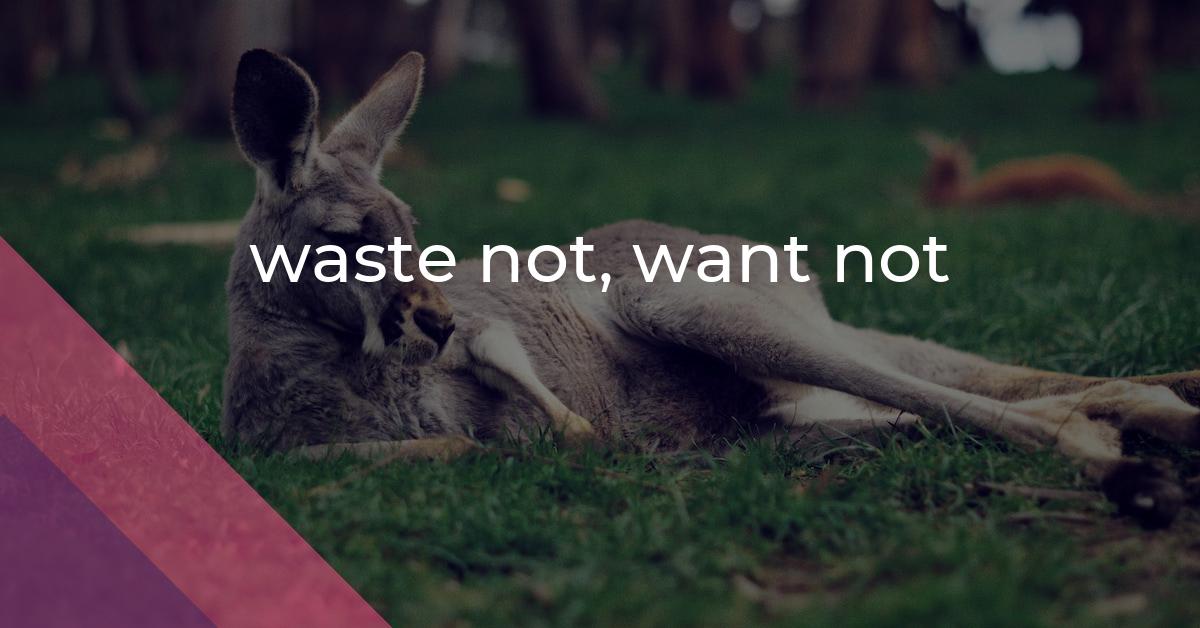waste not, want not: Idiom Meaning and Origin
What does ‘waste not, want not’ mean?
The idiom "waste not, want not" means that if you don't waste anything, you won't lack anything. It emphasizes the importance of being frugal and not being wasteful in order to avoid future wants or needs.

Idiom Explorer
The idiom "worth one's weight in gold" means that someone or something is extremely valuable or precious.
The idiom "we haven't got all day" means that there is limited time to do something and suggests the need to hurry or not waste time.
The idiom "waste breath" means to spend time and effort saying something that will not be listened to or taken seriously, resulting in a pointless or futile act of speaking.
The idiom "waste away" means to gradually become weaker, thinner, or less healthy, often due to illness or lack of proper care. It implies a continuous decline in physical condition or overall well-being.
The idiom "throw money away" means to spend money on something that is essentially wasteful or unnecessary, resulting in a loss of money or resources.
This phrase suggests a careless or frivolous attitude towards money, implying that the person is not concerned about the value or usefulness of what they are spending their money on.
The idiom "throw away" means to get rid of or discard something without considering its value or potential usefulness.
An idiom meaning an unrealistic or unattainable desire/expectation, often used to convey someone wanting something that is impossible to obtain.
An idiom widely used to refer to something insignificant or unimportant. It implies that the mentioned object or amount is of little value or significance.
An idiom is a phrase that does not have a literal meaning. The idiom "save" means to keep money or resources for future use, or to rescue someone or something from danger or harm.
The idiom "piss away" means to waste or squander something, especially money, in a careless or reckless manner.
A Surprising Adage on Avoiding Desires
The idiom "waste not, want not" is a well-known phrase in the English language. It conveys the idea that if one does not waste what they have, they will not find themselves lacking in the future. The origin of this idiom can be traced back to the 18th century, but its roots can be found in even earlier expressions with similar meanings. This idiom serves as a reminder of the value of resourcefulness and the potential benefits of adopting a more sustainable lifestyle.
The idiom implies that by using resources wisely and not wasting them, one will not experience a lack or shortage of those resources in the future. It echoes traditional principles of frugality and conservation, suggesting that by being mindful of one's consumption and waste, they can avoid future hardships or scarcities. This notion aligns with the idiom "penny wise and pound foolish," which warns against being overly focused on saving small amounts of money while neglecting to consider the bigger picture.
Over time, the idiom has become a widely recognized phrase, often used in various contexts beyond the literal meaning. It has been employed in discussions about personal finance, environmental sustainability, and even moral behavior. In these contexts, the idiom emphasizes the importance of mindful consumption and the potential consequences of wastefulness. The idiom "throw money away" captures the idea that if one wastes their money on frivolous or unnecessary things, they will find themselves in financial hardship. It reinforces the message of "waste not, want not" by highlighting the negative outcomes of thoughtless spending.
On a broader scale, the idiom serves as a reminder of the value of resourcefulness and the potential benefits of adopting a more sustainable lifestyle. In a society that often emphasizes excess and consumption, the idiom carries a powerful message about the need for moderation and prudence. This idea is echoed in the idiom "throw away," which implies discarding something without considering its value or potential usefulness. By refraining from "throwing away" resources and instead finding ways to utilize or repurpose them, individuals can contribute to a more sustainable future.
In addition to financial and environmental implications, the idiom "waste not, want not" can also be applied to personal habits and behaviors. The idiom "eat and leave no crumbs" encourages individuals to be mindful of their actions and to ensure they are not leaving behind a mess or waste. By being considerate and respectful of shared spaces, individuals can avoid conflicts and maintain harmonious relationships. Similarly, the idiom "not much of anything" highlights the importance of not taking things for granted and appreciating even the smallest resources or opportunities. By practicing gratitude and not wasting what we have, we can cultivate a sense of contentment and fulfillment.
The idiom "waste not, want not" encapsulates the timeless wisdom of using resources wisely and avoiding unnecessary waste. Its origins can be traced back to an earlier proverb and reflect traditional principles of frugality and conservation. The idiom has become ingrained in the English language and serves as a reminder of the potential consequences of wastefulness. It carries a broader message about the importance of mindfulness and sustainability in our consumption-driven society, leaving room for reflection on our own habits and choices.
Example usage
Examples of how the idiom "waste not, want not" can be used in a sentence:
- My grandmother always taught me to "waste not, want not," so I try to use up all the leftovers to avoid future hunger.
- We should remember the principle of "waste not, want not" when it comes to conserving water - using it responsibly now will prevent shortages in the future.
- Instead of throwing away old clothes, we can repair them or donate them to charity, following the idea of "waste not, want not."
More "Saving" idioms



